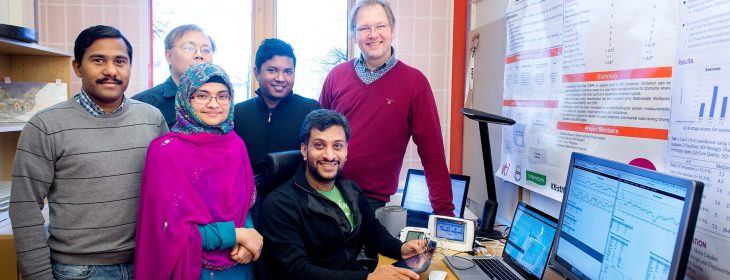Objective
The rapid development of digital technologies and advances in communications have led to gigantic amounts of data with complex structures called ‘Big data’ being produced every day at exponential growth. The aim of this course is to give the student insights in fundamental concepts of machine learning with big data as well as recent research trends in the domain. The student will learn about problems and industrial challenges through domain-based case studies. Furthermore, the student will learn to use tools to develop systems using machine-learning algorithms in big data.
Learning Outcomes
The student should after course completion be able to:
- describe the basic principles of machine learning and big data
- demonstrate the ability to identify key challenges to use big data with machine learning
- show the ability to select suitable machine Learning algorithms to solve a given problem for big data.
- demonstrate the ability to use tools for big data analytics and present the analysis result
Responsible:
Mälardalen University (Shahina Begum/Mobyen Uddin Ahmed)
Course modules:
Module 1. Introduction and background: introduction is intended to review Machine learning (ML) and Big Data processing techniques and its related subtopics with the focus on the underlying themes.
Module 2. Case studies: presents case studies from different application domains and discuss key technical issues e.g., noise handling, feature extraction, selection, and learning algorithms in developing such systems.
Module 3. Machine learning techniques in big data analytics: this module consists of basic understanding of learning theory, clustering analysis, deep learning and other classification techniques appropriate for development work and issues in construction of systems using Big data.
Module 4. Data analytics with tools: presents open source tools e.g., KNIME and Spark with examples that guide through the basic analysis of big data.
Related industrial challenges addressed in the course:
- Structure and evaluate the vast amount of data to make sure that it is feasible to solve the customer problem.
- Acquire new, previously unknown, knowledge from routinely available huge amount of industrial data to support effective automation, decision-making etc. in industries.
- Transform knowledge acquired from the data into machines. This knowledge can be used by automated systems in various fields and provide economic values.
More info:
- Course title in Swedish: Maskininlärning med Big Data
- Course code: DVA453 (at MdH), MDH-24537 (at antagning.se or universityadmissons.se)
- Course syllabus at Mälardalen University
- More information and application instructions at Mälardalen University
- Admission requirements: 90 credits of which at least 60 credits in Computer Science or equivalent, including at least 15 credits in programming. Applicants with at least 12 month (full-time) documented work-experience from software development have priority in the selection process.

